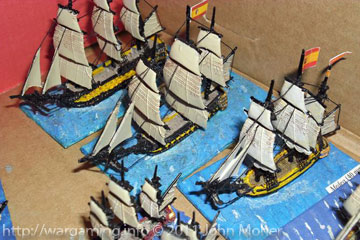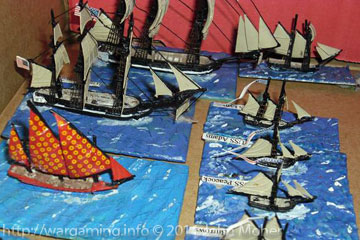The last year or so I’ve been trying to get back into some Napoleonic Naval Gaming – initially I started out using 1/1200th Langton Miniatures (and Rod Langton’s original edition of “Hoist The Signal For Close Action“) back in the early and mid-90’s but after moving to Auckland switched to the 1/2400th Hallmark ships when Fire As She Bears (FASB) first came out (as several AWC members already had that scale). Although I purchased FASB II when it came out I never really got back into Napoleonic Naval at all for most of the last decade (i.e. 2002-2010). However in the last 18 months I have sold off all the small 1/2400th ships and reverted to the larger 1/1200th scale, and I’ve subsequently purchased “Trafalgar” and the latest editions of both versions of Rod Langton’s rules (“Signal Close Action (SCA)” and “SCA Fast Play“), and with another AWC gamer also considering looking at “Kiss Me Hardy (KMH)” too.

I’ve started out by picking up some second hand Spanish and US vessels (mostly large Frigates and such plus a couple of Spanish SOLs – Ships Of the Line – that I’ll give a bit of a wash and spruce up to), and also purchased my first packs of vessels from Langton Miniatures for British & French vessels… The plan is to mostly play actions with large Frigates and/or small squadrons of smaller SOLs, rather than really large fleet actions… To date I’ve managed one try out game with another AWC member (Simon) where we gave “Trafalgar” a go with a couple of large Frigates each (Spanish vs. British) – the result was not overly exciting and had a very wooden feel (although Simon’s sailing skills with the British was especially bad that night, with one Frigate striking to the Spanish after being Stern Raked then rammed a couple of times, and the second trying to make a run for it after similar heavy damage). In fact we had so many accidental rams and near misses it felt more like bumper boats in a theme park! Having said that we will likely still give it another go or two over the coming months. “Trafalgar” also has in my opinion several inconsistencies in the rules and fleet lists which means the opposing fleets aren’t always well balanced when you are playing spontaneous pick-up games with generic lists rather than historical scenarios. It’s still a great game if you don’t know or care much about historical age of sail stuff, or are more comfortable with Warhammer style Game Mechanics, but it’s a bit bland and unhistorical if you know anything about the period or naval warfare in the 18th & early 19th Centuries or how sail ships actually sailed. However the book is recommended for it’s great assortment of peripheral information, photos, and other material if you can justify buying a copy regardless of whether you end up playing the rules or not…

Rod Langton’s “Signal Close Action (Fast Play)” looks more my cup of tea personally – it’s built around the original full “Hoist The Signal For Close Action” rules (which is now in it’s 4th Edition) but trimmed down to it’s simplest form and with some things abstracted into simplified features. It looks ideal for quick easy ‘beer ‘n’ pretzels’ type games and yet still suitable for historical refights. I bought the latest 4th edition of the full Hoist The Signal For Close Action rules as well, as I am hoping if playing SCAFP for specific scenarios it may be possible to graft on temporarily odd sections of the full rules (such as resolving boarding actions as an example).
Kiss Me Hardy looks interesting – but mainly due to the random move & fire sequence attributes – very akin to what The Sword And The Flame does for Colonials – and I don’t actually see why this may not be able to be grafted onto Langton’s SCA Fast Play rules? But hopefully we’ll get back into a few smaller games soon so we can try all these things out…
Curiously enough an ex-pat NZ Wargamer in Australia, Stephen Cumming, has posted some vaguely similar thoughts along these lines as well this week in his post Jolly Jack Tars at Small Sagas. And it’ll be interesting to see what conclusions he comes to over in Melbourne…
Completely concur with your own experiences with Trafalagar and SCAFP. The latter gives a much better game, and the only thing that it ‘Needs’ tacked on, is a slightly different sailing speed system. Trafalgar has too many idiosyncracies and is too dice driven.
Hi Doug – yes, we found Trafalgar very random and I was also disappointed with the author’s response regarding some things, including a query I had on the Trafalgar Group about the points values – i.e. Why are all Spanish ships less points than the British equivalent EXCEPT the large Frigate? It highlights the points aren’t using any logical (mathematical) system and are just arbitrary guesses, etc…
I very much enjoy Trafalgar. My group has been playing since it came out, and in that time we have managed something like 20 or more games. Very enjoyable, always an exciting game to the last shot.
Thanks for the post Grant – yes its interesting different peoples’ experiences & expectations. I’ll confess I’ve only played it twice, but it became immediately apparent from those two games there’s just too much luck involved for my liking, and it’s not consistent in how nationalities are rated & their special characteristics versus how ships & fleets are valued… A fun game yes, but not overly historically accurate I think.
🙂